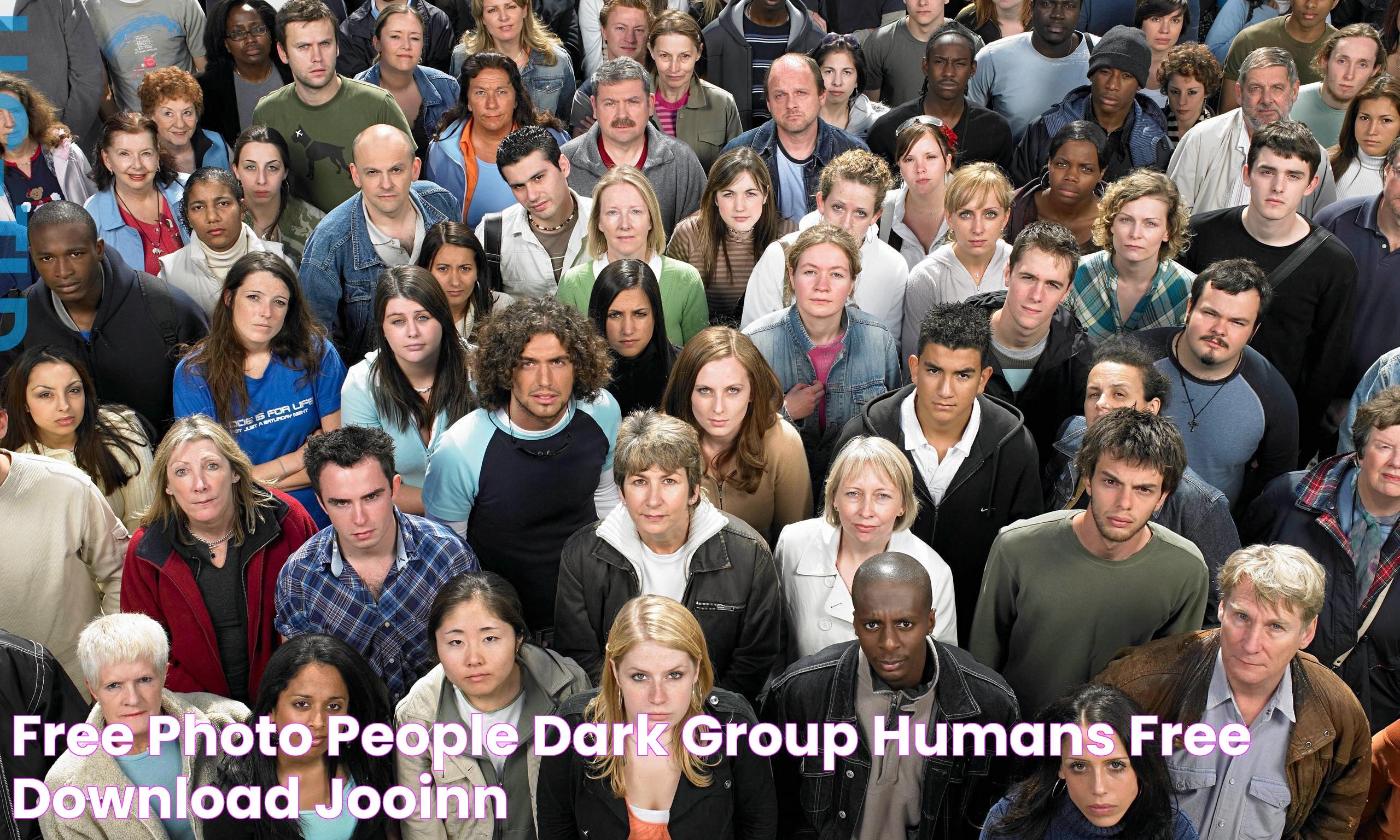Uncover The Secrets Of Connecting With Many People
Within the domain of linguistics, the term "many people" serves as an indefinite pronoun, denoting a large, unspecified number of individuals within a given context or population.
The significance of "many people" stems from its role in representing the collective voice or perspective of a substantial portion of a community or group. It acknowledges the diversity and multiplicity of human experiences, opinions, and beliefs while emphasizing the presence of shared characteristics, experiences, or goals.
Throughout history, the phrase "many people" has been employed to convey various societal and political ideas. For instance, it has been used to highlight the collective will or aspirations of a population in movements for social change or to express solidarity among individuals who share common interests or identities. Moreover, the concept of "many people" often serves as a foundation for decision-making processes that aim to represent the diverse interests within a given society.
Read also:Amazing Facts About Manehasnet Explore Now
Many People
The significance of "many people" as an indefinite pronoun lies in its ability to capture the collective experiences, perspectives, and aspirations of a substantial portion of a population. It encompasses a range of key aspects:
- Diversity: Many people represent a multitude of backgrounds, experiences, and beliefs.
- Shared Experiences: They share common experiences that shape their collective identity and aspirations.
- Collective Voice: Many people can amplify individual voices, giving strength to shared concerns or goals.
- Societal Impact: Their collective actions and decisions have a significant impact on society's direction and well-being.
- Representation: Many people often serve as representatives of broader societal interests or perspectives.
- Historical Significance: Throughout history, the concept of "many people" has played a pivotal role in social movements and political discourse.
In essence, "many people" highlights the importance of considering the collective experiences and perspectives of a substantial portion of a population. It acknowledges the diversity within society while emphasizing the power of shared experiences and aspirations. Understanding these aspects is crucial for fostering inclusive decision-making, promoting social cohesion, and recognizing the collective impact of individuals.
1. Diversity
The diversity encompassed by "many people" is a fundamental aspect that shapes their collective identity and experiences. It encompasses a range of facets that contribute to the richness and complexity of human society:
- Cultural Heritage: Many people come from diverse cultural backgrounds, influenced by their unique traditions, values, and practices. This cultural diversity enriches societies and fosters a vibrant exchange of ideas and perspectives.
- Life Experiences: Each individual has a unique set of life experiences that shape their worldview and beliefs. These experiences, such as education, travel, or personal challenges, contribute to the collective wisdom and diversity of perspectives within "many people."
- Belief Systems: Many people hold a wide range of religious, spiritual, or philosophical beliefs that influence their values and actions. This diversity of belief systems contributes to the richness of human thought and encourages dialogue and understanding.
- Social Identities: Many people belong to diverse social groups based on factors such as ethnicity, gender, sexual orientation, or socioeconomic status. These social identities shape their experiences and perspectives, contributing to the multifaceted nature of "many people."
In conclusion, the diversity represented by "many people" is a celebration of human uniqueness and a source of collective strength. It fosters inclusivity, understanding, and the recognition that every individual's experiences and perspectives contribute to the richness and complexity of society.
2. Shared Experiences
Within the concept of "many people," shared experiences hold immense significance as they forge a collective identity and shape shared aspirations. Common experiences serve as a crucible that unites individuals, fostering a sense of belonging and purpose within a group.
These shared experiences can manifest in various forms: social interactions, cultural traditions, historical events, or common challenges. They create a shared frame of reference, shaping the collective mindset, values, and goals of "many people." By going through similar experiences, individuals develop a deeper understanding of each other's perspectives, leading to empathy, solidarity, and a sense of.
Read also:69 Kilogram To Pounds Easily Convert With Precision
For instance, in times of crisis or adversity, "many people" often come together, united by their shared experiences of hardship and resilience. These experiences strengthen their collective resolve and inspire them to work towards common goals, such as rebuilding their communities or advocating for change.
Moreover, shared experiences play a crucial role in shaping the cultural identity of "many people." They preserve and transmit cultural heritage, traditions, and values from one generation to the next, ensuring cultural continuity and a sense of rootedness within the community. By participating in shared cultural practices, such as festivals, rituals, or storytelling, "many people" reinforce their collective identity and pass on their cultural legacy.
In conclusion, the shared experiences of "many people" are a powerful force that shapes their collective identity, aspirations, and cultural heritage. Understanding the significance of these shared experiences is essential for fostering social cohesion, preserving cultural diversity, and harnessing the collective power of "many people" to create positive change.
3. Collective Voice
The collective voice of "many people" serves as a powerful amplifier for individual voices, enabling them to advocate for shared concerns and goals with greater impact. By uniting their voices, "many people" can amplify messages that might otherwise go unheard, drawing attention to important issues and mobilizing support for desired change.
This collective voice plays a crucial role in empowering individuals and communities to influence decision-making processes and shape the direction of society. Through collective action, "many people" can raise awareness, demand accountability, and advocate for policies that align with their shared values and aspirations.
For instance, the Civil Rights Movement in the United States is a testament to the power of collective voice. By uniting their voices, African Americans were able to challenge racial segregation and discrimination, leading to landmark legislation such as the Civil Rights Act of 1964. Similarly, the #MeToo movement gained momentum through the collective voices of survivors of sexual assault, breaking the silence and stigma surrounding this issue and inspiring global conversations about consent and accountability.
Understanding the significance of collective voice is essential for fostering inclusive societies where diverse voices are heard and valued. It empowers individuals to participate in shaping their communities and the world around them, ensuring that the concerns and aspirations of "many people" are not marginalized or silenced.
4. Societal Impact
The actions and decisions of "many people" have a profound impact on shaping the direction and well-being of society. They are not merely passive observers but active agents who, through their collective power, can influence the course of history and create positive change.
One of the most significant ways in which "many people" exert their societal impact is through political participation. By exercising their right to vote and holding elected officials accountable, they can influence policy decisions that affect various aspects of society, such as education, healthcare, and environmental protection. Grassroots movements and advocacy groups, driven by the collective voice of "many people," have played a pivotal role in shaping public discourse and social progress.
Furthermore, the economic decisions made by "many people," such as consumer choices and investment patterns, can have a ripple effect on industries, markets, and the overall economy. By supporting sustainable businesses, investing in renewable energy, and advocating for fair trade practices, "many people" can promote economic growth while addressing social and environmental concerns.
Understanding the societal impact of "many people" is crucial for fostering a sense of civic responsibility and empowering individuals to actively participate in shaping their communities and the world around them. It highlights the importance of collective action and collaboration in addressing complex challenges and working towards a more just and equitable society.
5. Representation
The concept of "many people" is closely intertwined with the idea of representation. Many people often serve as representatives of broader societal interests or perspectives, acting as a collective voice for various groups within society.
- Political Representation: In democratic societies, elected officials are chosen to represent the interests of their constituents. These officials make decisions on behalf of "many people," considering their needs, concerns, and aspirations.
- Social Movements: Many people come together to form social movements that advocate for specific causes or issues. These movements often represent the interests and perspectives of marginalized or underrepresented groups, amplifying their voices and demanding social change.
- Cultural Representation: Many people from diverse backgrounds and cultures share their experiences and perspectives through art, literature, and media. These expressions serve as a form of representation that reflects the richness and diversity of human experiences, challenging stereotypes and promoting cultural understanding.
- Historical Narratives: The stories and experiences of "many people" are often documented and preserved in historical accounts. These narratives shape our understanding of the past and present, providing insights into the collective struggles, triumphs, and aspirations of different groups throughout history.
Understanding the role of "many people" as representatives of broader societal interests is crucial for fostering inclusive societies that value diverse perspectives and experiences. It highlights the importance of ensuring that all voices are heard and considered in decision-making processes, leading to more just and equitable outcomes.
6. Historical Significance
The concept of "many people" has been inextricably linked to social movements and political discourse throughout history, serving as a powerful force for change and a voice for the collective aspirations of diverse populations.
- Mobilization and Collective Action: Many people have come together to form social movements, uniting their voices and actions to advocate for social justice, political change, and human rights. From the labor movement to the civil rights movement, the collective power of "many people" has been instrumental in shaping societies and improving the lives of marginalized groups.
- Representation and Political Influence: The concept of "many people" has also played a crucial role in political discourse, as leaders and policymakers have sought to represent the interests and concerns of their constituencies. Political parties, interest groups, and advocacy organizations often mobilize "many people" to influence policy decisions, ensuring that diverse perspectives and needs are considered in the decision-making process.
- Historical Narratives and Cultural Identity: The experiences and struggles of "many people" have been documented and passed down through oral traditions, literature, and art, shaping historical narratives and cultural identities. These narratives provide insights into the collective memory and lived experiences of diverse groups, fostering a sense of belonging and solidarity among individuals who share similar backgrounds and aspirations.
- Social and Political Transformation: Throughout history, "many people" have been at the forefront of social and political transformations. From revolutions that overthrew oppressive regimes to peaceful protests that brought about positive change, the collective actions and voices of "many people" have played a pivotal role in reshaping societies and creating a more just and equitable world.
In conclusion, the concept of "many people" has been deeply embedded in social movements and political discourse throughout history. Many people have mobilized their collective power to advocate for change, influence policy decisions, shape cultural identities, and drive social and political transformations, leaving a lasting impact on the course of human history.
Frequently Asked Questions about "Many People"
This section addresses common questions and misconceptions surrounding the concept of "many people." It provides informative answers to enhance understanding and clarify the significance of this term in various contexts.
Question 1: What exactly is meant by the term "many people"?Many people refer to a large, unspecified number of individuals within a given context or population. It encompasses a substantial portion of a community or group, highlighting the diversity and multiplicity of human experiences, opinions, and beliefs.
Question 2: How does the concept of "many people" differ from "the majority"?While both terms relate to a large number of individuals, "many people" do not necessarily imply a numerical majority. It emphasizes the collective experiences and perspectives of a substantial group, regardless of whether they constitute more than half of the population.
Question 3: Why is it important to consider the perspectives of "many people"?Understanding the collective voice of "many people" is crucial for inclusive decision-making and social cohesion. Their experiences, concerns, and aspirations represent a diverse range of perspectives that contribute to a more comprehensive understanding of societal needs and aspirations.
Question 4: How can the collective actions of "many people" impact society?Throughout history, "many people" have played a significant role in driving social and political change. Their collective actions, such as social movements and political participation, have influenced policy decisions, shaped cultural norms, and brought about positive transformations in society.
Question 5: How does diversity contribute to the significance of "many people"?The diversity represented by "many people" enriches societies and fosters a vibrant exchange of ideas. It encompasses cultural heritage, life experiences, belief systems, and social identities, contributing to the complexity and richness of human perspectives.
Question 6: What are some examples of the historical impact of "many people"?Many people have been at the forefront of social movements, revolutions, and political transformations throughout history. From the labor movement to the civil rights movement, their collective actions and voices have left a lasting impact on shaping societies and improving the lives of marginalized groups.
In conclusion, "many people" represent a powerful force that shapes our understanding of society, drives change, and contributes to the diversity and richness of human experience. Recognizing and valuing their collective perspectives is essential for fostering inclusive and just societies.
Transition to the next article section: Understanding the concept of "many people" provides a foundation for exploring its implications in various domains, including social movements, political discourse, and cultural representation.
Tips from Many People
To effectively engage with the concept of "many people," consider these valuable tips:
Tip 1: Recognize the Diversity: Acknowledge and appreciate the diverse backgrounds, experiences, and perspectives represented within the group. Value each individual's unique contribution.
Tip 2: Foster Inclusive Communication: Create an environment where all voices are heard and respected. Encourage active listening and open dialogue to ensure that diverse perspectives are considered.
Tip 3: Seek Common Ground: Identify shared values, goals, or experiences that unite the group. Focus on these commonalities to build bridges and foster a sense of collective identity.
Tip 4: Empower Collective Action: Encourage and support initiatives that mobilize the collective power of the group. Facilitate collaboration and teamwork to achieve shared objectives.
Tip 5: Promote Representation: Ensure that the voices and perspectives of "many people" are represented in decision-making processes and leadership roles. This fosters inclusivity and ensures that diverse viewpoints are considered.
Tip 6: Respect Dissent: Recognize that not all individuals will share the same opinions or perspectives. Respect and value dissenting views, as they contribute to a more comprehensive understanding of the group's dynamics.
Tip 7: Foster a Culture of Learning: Encourage ongoing learning and dialogue about the experiences and perspectives of "many people." This promotes empathy, understanding, and a commitment to continuous improvement.
Tip 8: Celebrate Collective Achievements: Recognize and celebrate the successes and contributions of the group as a whole. This reinforces a sense of collective accomplishment and fosters a positive and motivating environment.
By incorporating these tips, individuals and organizations can harness the power of "many people" to create more inclusive, equitable, and thriving communities.
Transition to the article's conclusion: Embracing these principles provides a roadmap for effective engagement with "many people," leading to positive outcomes and a deeper understanding of the collective human experience.
Conclusion
Throughout this exploration, we have delved into the multifaceted concept of "many people," uncovering its significance and impact across various domains. We have emphasized the power of collective experiences, perspectives, and actions in shaping societies, driving change, and enriching human understanding.
Embracing the diversity and collective wisdom of "many people" is not merely a matter of numbers, but a commitment to inclusivity, equity, and progress. By fostering environments where diverse voices are heard, valued, and empowered, we unlock the true potential of human collaboration and innovation. Let us continue to celebrate the richness of perspectives, work towards common goals, and recognize that the collective power of "many people" is an invaluable asset for building a better future for all.
Discover Sheldon Cooper's Alma Mater And Education Journey
Explore The World Of Tauriel: A Guide To A Legendary Elf
Leonardo DiCaprio's Age: Uncovering The True Number


